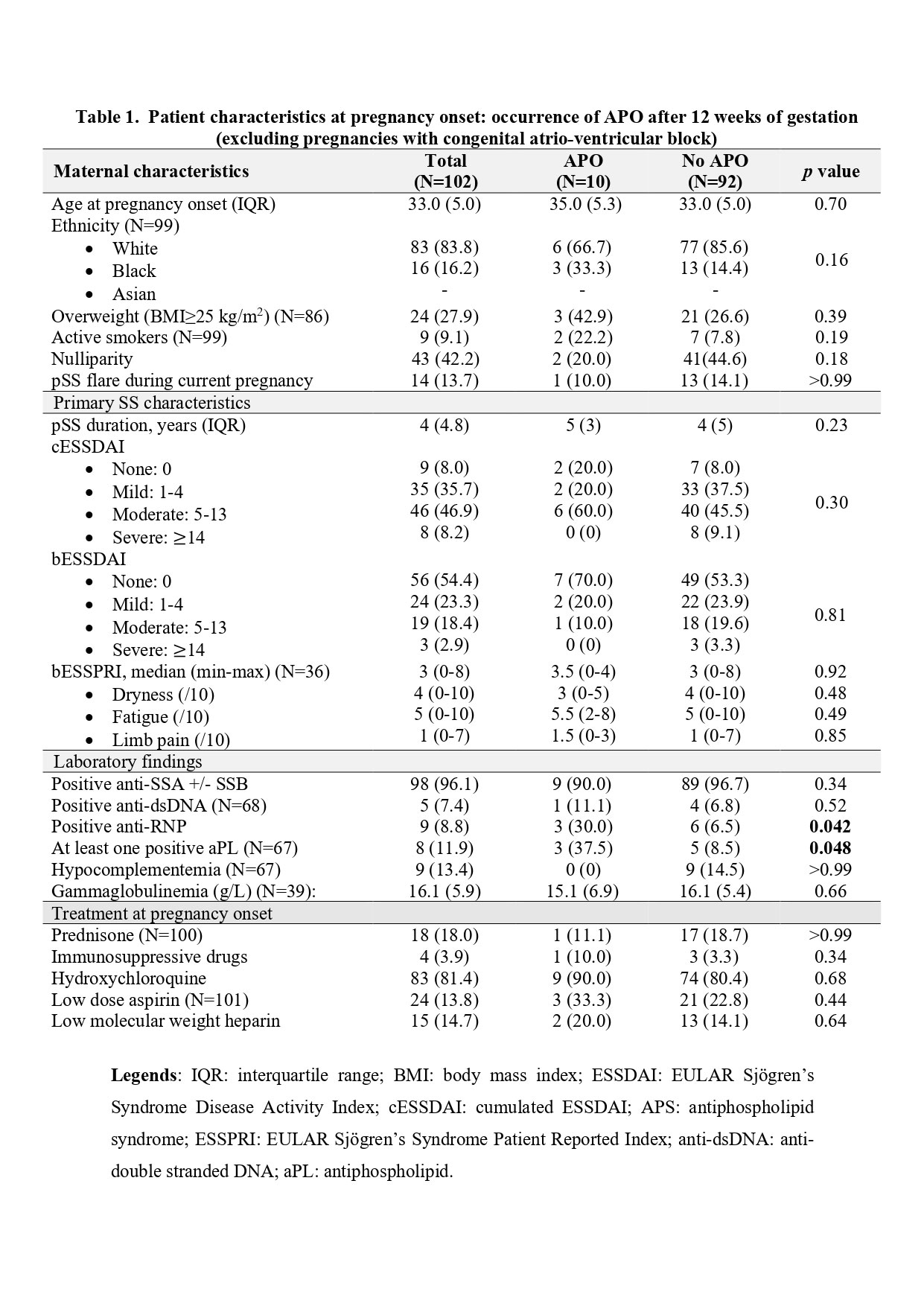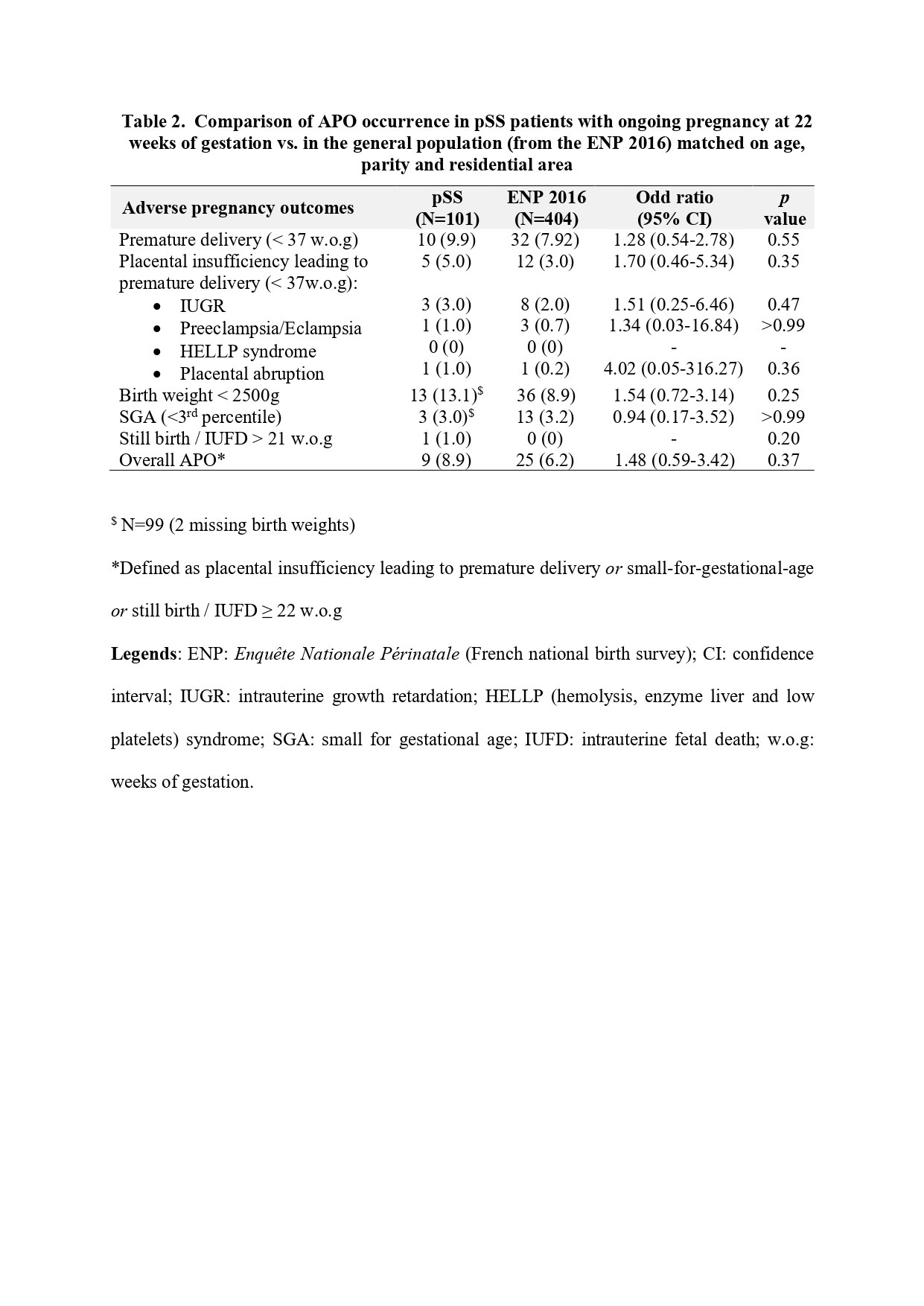Session Information
Session Type: Poster Session D
Session Time: 1:00PM-3:00PM
Background/Purpose: In the context of primary Sjögren’s syndrome (pSS), only a few retrospective studies using heterogeneous methods have investigated the risk of adverse pregnancy outcomes (APO) with inconsistent results (APO frequency ranging from similar to the general population to ≥50% of pregnancies). Moreover, these studies rarely analyzed the impact of pregnancy on the course of pSS. We here aimed to describe the outcome of pregnancies in pSS and compare it to that of the general population.
Methods: The GR2 study is a French prospective cohort of pregnancies in women affected with auto-immune diseases involving 76 centers. The ENP is a French national perinatal survey on a sample of around 14.000 births, repeated every 5 years. We included GR2 pSS women fulfilling ACR/EULAR 2016 criteria with an ongoing pregnancy at 13 weeks of gestation. EULAR Sjögren’s Syndrome Disease Activity Index and Patient Reported Index (ESSDAI and ESSPRI) were recorded at the first trimester of each pregnancy (baseline or bESSDAI), each trimester and at delivery, and a cumulative ESSDAI (cESSDAI) was calculated, defined as the sum of each domain maximum score during follow-up before pregnancy. A pSS flare was defined as an increase 3 points of the ESSDAI. APO were defined as the occurrence of any of the following events: unexplained intrauterine foetal death
13 weeks, neonatal death, placental insufficiency (intrauterine growth restriction, preeclampsia/eclampsia, HELLP syndrome, and/or placental abruption) leading to a premature delivery < 37 weeks or small-for-gestational-age birth weight. We compared the risk of APO occurring ≥ 22 weeks of gestation in pSS pregnancies to general population pregnancies from the 2016 ENP report, after matching (ratio 1:4) on age, parity and residential area. We performed a sensitivity analysis including congenital atrio-ventricular block (cAVB) in APO (APOblock).
Results: 106 pregnancies occurred in 96 pSS women. pSS flares occurred in 14/106 (13.2%) pregnancies. Analyses did not identify any baseline parameter associated with the risk of pSS flare, in particular no association with ethnicity, cESSDAI, bESSDAI, or bESSPRI, biological markers of activity or type of autoantibodies. APO occurred in 10/102 (9.8%) [APOblock in 14/106 (13.2%)] pregnancies including only one with a pSS flare (Table 1). Women with and without APO had comparable age, weight, smoking status, cESSDAI, bESSDAI or bESSPRI at inclusion. However, women with APO had more often anti-RNP (30% vs 6.5%, p=0.042) and antiphospholipid (aPL) antibodies (n available=67, 37.5% vs 8.5%, p=0.048). Treatment exposure did not differ between groups. In sensitivity analysis, women with APOblock were more often Afro-Caribbean (38.5% vs 14.4%, p=0.049). APO frequency in pSS did not differ from that of the ENP population (8.9% vs 6.2%, OR 1.48 [0.59-3.42], p = 0.37) (Table 2).
Conclusion: APO and pSS flares were observed respectively in 9.8% and 13.2% of pregnancies but did not occur together. Anti-RNP and aPL antibodies were associated with a higher risk of APO, and ethnicity when including cAVB. APO frequency in pSS women was comparable to that of the general population.
To cite this abstract in AMA style:
Martin de Fremont G, Costedoat-Chalumeau N, Belkhir R, Guettrot-Imbert G, Morel N, Nocturne G, Molto A, Goulenok T, Diot E, Lazaro E, Perard L, Ferreira N, Le Besnerais M, Limal N, Martis N, Abisror N, Debouverie O, Richez C, Sobanski V, Maurier F, Sauvetre G, Levesque H, Timsit M, Tieule N, Orquevaux P, Collaborative group G, Mahevas M, Lartigau Roussin C, Chauvet E, Berthoux E, Sarrot Reynauld F, Raffray L, Couderc M, Martin Silva N, Jourde Chiche N, Belhomme N, Thomas T, Poindron V, Queyrel V, Delforge J, Le Ray C, Pannier E, Mariette X, Le Guern V, Seror R. Outcome of Pregnancy in Women with Primary Sjögren’s Syndrome Compared to the General Population: The French Multicenter Prospective GR2 Study [abstract]. Arthritis Rheumatol. 2022; 74 (suppl 9). https://acrabstracts.org/abstract/outcome-of-pregnancy-in-women-with-primary-sjogrens-syndrome-compared-to-the-general-population-the-french-multicenter-prospective-gr2-study/. Accessed .« Back to ACR Convergence 2022
ACR Meeting Abstracts - https://acrabstracts.org/abstract/outcome-of-pregnancy-in-women-with-primary-sjogrens-syndrome-compared-to-the-general-population-the-french-multicenter-prospective-gr2-study/


